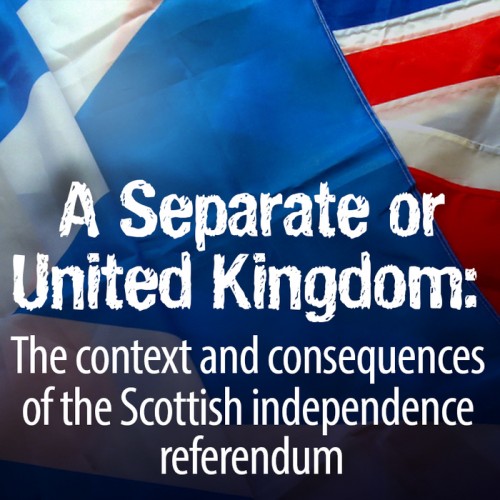 As the Scottish independence referendum campaign enters its final stages, both sides will still be hoping that they can persuade as many voters as possible that their side is right. Although undoubtedly some voters are still to decide which way they will vote, the minds of most voters were made up long ago and the campaign will have made little difference. Political psychologists have convincingly shown that voters aren’t particularly good at making objective assessments of arguments about political issues – regardless of their actual validity, we tend to think that arguments that support our positions are good and arguments that don’t are bad. Even when voters have the same factual information, partisan bias leads to very different conclusions. The stability of the referendum polls despite the long and intense campaign suggests that these factors are almost certainly playing an important role in opinions on the independence debate.
As the Scottish independence referendum campaign enters its final stages, both sides will still be hoping that they can persuade as many voters as possible that their side is right. Although undoubtedly some voters are still to decide which way they will vote, the minds of most voters were made up long ago and the campaign will have made little difference. Political psychologists have convincingly shown that voters aren’t particularly good at making objective assessments of arguments about political issues – regardless of their actual validity, we tend to think that arguments that support our positions are good and arguments that don’t are bad. Even when voters have the same factual information, partisan bias leads to very different conclusions. The stability of the referendum polls despite the long and intense campaign suggests that these factors are almost certainly playing an important role in opinions on the independence debate.
If vote intentions in the referendum aren’t a result of objective evaluations of the pros and cons of Scottish independence, where do these opinions come from? Political attitudes are not simply created in a vacuum, nor do they just reflect self-interest according to socio-economic position. Scholars have long suspected that political attitudes arise from deep-seated psychological dispositions – particularly from differences in personality. For psychologists, ‘personality’ captures the patterns of thought, feeling, and behaviour that are relatively stable within individuals in different situations and across time: people who are organised at work are also likely to be organised at home; shy children often grow up to be shy adults. For the past few decades, the leading paradigm in personality psychology has been the ‘Big Five’ approach, which has shown that much of the variation in personality traits between people can be captured by five dimensions – agreeableness, conscientiousness, emotional stability (sometimes labelled ‘neuroticism’), extraversion, and openness to experience.
Scholars have consistently found that two of these – conscientiousness and openness to experience – are consistently linked with political attitudes. People who have high levels of conscientiousness tend to be well organised, self-disciplined, goal oriented and dutiful, whilst those with low levels are likely to be disorganised, messy, and ‘laid back’. People who are high on the openness to experience dimension generally crave new experiences, are curious, like abstract ideas, and tend to be creative. Those low on the openness dimension prefer familiar activities, concrete ideas, and tradition. People who are high on the conscientiousness dimension tend to be politically (small ‘c’) conservative (that is favours tradition and stability, not necessarily supporters of the Conservative Party), whilst those who are high on the openness dimension tend to be political liberal (again those who favour reform and change, not necessarily those who support any particular party).
It is not hard to see why this might be the case. Political conservatives tend to prefer order and hierarchy (everyone in their place) – as do people high on conscientiousness (everything in its place) – whilst liberals favour individual autonomy and freedom, not unlike the ‘anything goes’ attitudes of those low on conscientiousness. Those high on openness to experience tend to favour change and embrace what is new in much the same way as liberals whilst those who are low on openness and political conservatives prefer tradition and the status quo.
How might differences in personality affect opinions towards Scottish independence? In many ways the debate over Scottish independence lines up along conservative and liberal lines. In very simple terms Scottish independence is about something that already exists vs something new – suggesting those low on openness are likely to support ‘no’ and those high on openness are likely to support ‘yes’. Similarly ‘no’ opinions might be thought of as support for the existing order and hierarchy of the United Kingdom – drawing support from those high on conscientiousness – whilst supporters of ‘yes’ favour a more autonomous Scotland – perhaps appealing to those low on conscientiousness.
We do not just have to speculate on these questions. The current British Election Study has collected data from about 4,000 Scots on a variety of political issues – one of which is Scottish independence – and also includes a large amount of background information, including each respondent’s placement on the ‘Big Five’ personality dimensions. As the graph below shows, the relationship between conscientiousness and openness to experience I suggested above is what we find in the data – those who are high on conscientiousness and those who are low on openness are the least likely to support Scottish independence, and as people become less conscientious and more open to experience support for independence rises. Those highest on conscientiousness are 11% less likely to vote yes than those lowest and those highest on openness are about 15% more likely to vote yes than those lowest.
As well as a direct effect on support for Scottish independence, personality also has important indirect effects, which operate through the influence of personality on things such as a voter’s sense of national identity and appetite for risk. Unsurprisingly, one of the best predictors of vote intention in the independence referendum is a voter’s national identity. As the graph below shows, vote intention can been seen as a function of the combination of two aspects of a voter’s sense of national identity – how much they feel ‘British’ and how much they feel ‘Scottish’. Those who feel highly Scottish but not British are very likely to support independence, whilst those who feel highly British are unlikely to support independence, even when they feel highly Scottish.
Much like political attitudes, the strength of someone’s national identity is heavily influenced by personality. A strong sense of national identity might help people to understand where they and other people ‘fit’ in the grand scheme of life and so are likely to appeal to those high on conscientiousness. Similarly national identities connect people with the past and to traditions and so are likely to appeal to those low on openness to experience. Interestingly the data from the British Election Study suggest that that this is true for British identity but not for Scottish identity. The graphs below show that respondents’ sense of Britishness rises with conscientiousness and falls with openness. Scottishness however seems almost completely unaffected by personality (a very interesting result in itself, but for the time being we can only speculate as to why this is the case). The effect of personality on British identity and the importance of national identity for support for independence again suggests that personality is vitally important to understanding attitudes towards Scottish independence.
Finally personality might have an influence over attitudes towards independence through a person’s attitude towards risk. Other research has shown that attitudes towards risk is an excellent – possibly even the best – predictor of support for independence. No voters are particularly worried about the perceived risks involved in Scotland becoming independent and those who are generally more willing to take risks are more likely to support independence. Attitudes towards risk are also heavily influenced by personality – particularly by openness to experience: as the graph below shows, those who are more open to experience are in general more willing to take risks than those who are not.
All of the above suggests that before they even consider the issue of Scottish independence, some voters are predisposed to support independence whilst others are predisposed to reject it. Whether they are aware of the political psychology literature or not, the influence of personality on support for independence is reflected in both sides of the referendum campaign. The yes campaign has largely taken the natural supporters of independence for granted, concentrating instead on trying to reassure those more inclined to vote no of the continuity of traditions and down playing the risks of independence – tactics more likely to appeal to those high on conscientiousness and low on openness to experience. The no campaign has tried to counter these arguments and mobilise opponents of independence by playing up the risks of an independent Scotland and the break with tradition – again tactics aimed at voters high on conscientiousness and low on openness. Other research in political psychology suggests that the no campaign has had a much easier job – those inclined to political conservatism are more likely to have a ‘negativity bias’ in their response to environmental stimuli – conservatives have more of a physiological reaction to potential threats in the environment and subsequently devote more psychological resources towards dealing with them: conservatives, quite literately, see more things that could go wrong than liberals.
Despite the millions of pounds and countless words spent by both sides of the campaign there is little evidence that it has made much difference to the outcome of the referendum. The polls have been very stable and nothing either side has said seems to have had any lasting impact. From a political psychology perspective this is not surprising. Political attitudes – including attitudes about Scottish independence – have deep-rooted and stable foundations in something common to everyone but unique in each of us: personality.
This post is part of “A Separate or United Kingdom“, our blog series analysing the issues surrounding the Scottish referendum.












2 Comments
Very nice article, Chris!